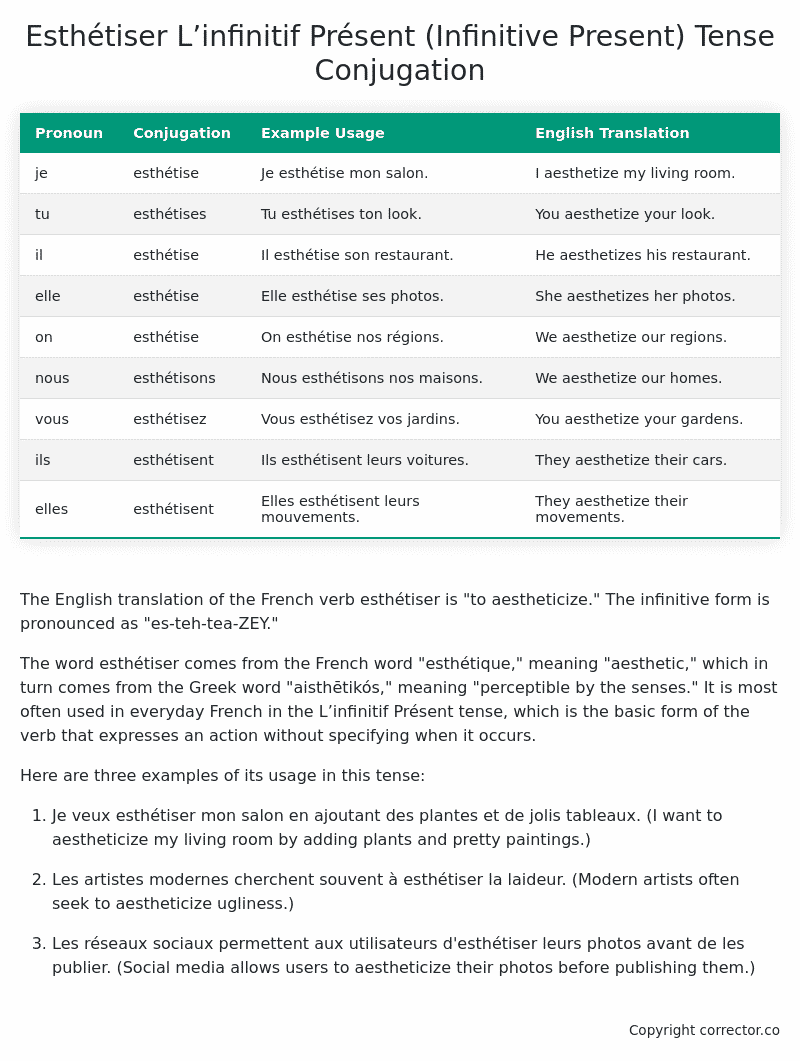L’infinitif Présent (Infinitive Present) Tense Conjugation of the French Verb esthétiser
Introduction to the verb esthétiser
The English translation of the French verb esthétiser is “to aestheticize.” The infinitive form is pronounced as “es-teh-tea-ZEY.”
The word esthétiser comes from the French word “esthétique,” meaning “aesthetic,” which in turn comes from the Greek word “aisthētikós,” meaning “perceptible by the senses.” It is most often used in everyday French in the L’infinitif Présent tense, which is the basic form of the verb that expresses an action without specifying when it occurs.
Here are three examples of its usage in this tense:
-
Je veux esthétiser mon salon en ajoutant des plantes et de jolis tableaux. (I want to aestheticize my living room by adding plants and pretty paintings.)
-
Les artistes modernes cherchent souvent à esthétiser la laideur. (Modern artists often seek to aestheticize ugliness.)
-
Les réseaux sociaux permettent aux utilisateurs d’esthétiser leurs photos avant de les publier. (Social media allows users to aestheticize their photos before publishing them.)
Table of the L’infinitif Présent (Infinitive Present) Tense Conjugation of esthétiser
| Pronoun | Conjugation | Example Usage | English Translation |
|---|---|---|---|
| je | esthétise | Je esthétise mon salon. | I aesthetize my living room. |
| tu | esthétises | Tu esthétises ton look. | You aesthetize your look. |
| il | esthétise | Il esthétise son restaurant. | He aesthetizes his restaurant. |
| elle | esthétise | Elle esthétise ses photos. | She aesthetizes her photos. |
| on | esthétise | On esthétise nos régions. | We aesthetize our regions. |
| nous | esthétisons | Nous esthétisons nos maisons. | We aesthetize our homes. |
| vous | esthétisez | Vous esthétisez vos jardins. | You aesthetize your gardens. |
| ils | esthétisent | Ils esthétisent leurs voitures. | They aesthetize their cars. |
| elles | esthétisent | Elles esthétisent leurs mouvements. | They aesthetize their movements. |
Other Conjugations for Esthétiser.
Le Present (Present Tense) Conjugation of the French Verb esthétiser
Imparfait (Imperfect) Tense Conjugation of the French Verb esthétiser
Passé Simple (Simple Past) Tense Conjugation of the French Verb esthétiser
Passé Composé (Present Perfect) Tense Conjugation of the French Verb esthétiser
Futur Simple (Simple Future) Tense Conjugation of the French Verb esthétiser
Futur Proche (Near Future) Tense Conjugation of the French Verb esthétiser
Plus-que-parfait (Pluperfect) Tense Conjugation of the French Verb esthétiser
Passé Antérieur (Past Anterior) Tense Conjugation of the French Verb esthétiser
Futur Antérieur (Future Anterior) Tense Conjugation of the French Verb esthétiser
Subjonctif Présent (Subjunctive Present) Tense Conjugation of the French Verb esthétiser
Subjonctif Passé (Subjunctive Past) Tense Conjugation of the French Verb esthétiser
Subjonctif Imparfait (Subjunctive Imperfect) Tense Conjugation of the French Verb esthétiser
Subjonctif Plus-que-parfait (Subjunctive Pluperfect) Tense Conjugation of the French Verb esthétiser
Conditionnel Présent (Conditional Present) Tense Conjugation of the French Verb esthétiser
Conditionnel Passé (Conditional Past) Tense Conjugation of the French Verb esthétiser
L’impératif Présent (Imperative Present) Tense Conjugation of the French Verb esthétiser
L’infinitif Présent (Infinitive Present) Tense Conjugation of the French Verb esthétiser (this article)
Struggling with French verbs or the language in general? Why not use our free French Grammar Checker – no registration required!
Get a FREE Download Study Sheet of this Conjugation 🔥
Simply right click the image below, click “save image” and get your free reference for the esthétiser L’infinitif Présent tense conjugation!

Esthétiser – About the French L’infinitif Présent (Infinitive Present) Tense
Forming the Infinitive Present
Common Everyday Usage Patterns
As a Verb’s Dictionary Form
After Modal Verbs
As an Imperative
In Infinitive Clauses
Interactions with Other Tenses
Present Tense
Future Tense
Conditional Tense
Passé Composé
Imperfect Tense
Subjunctive and Conditional Moods
Summary
Want More?
I hope you enjoyed this article on the verb esthétiser. Still in a learning mood? Check out another TOTALLY random French verb conjugation!


